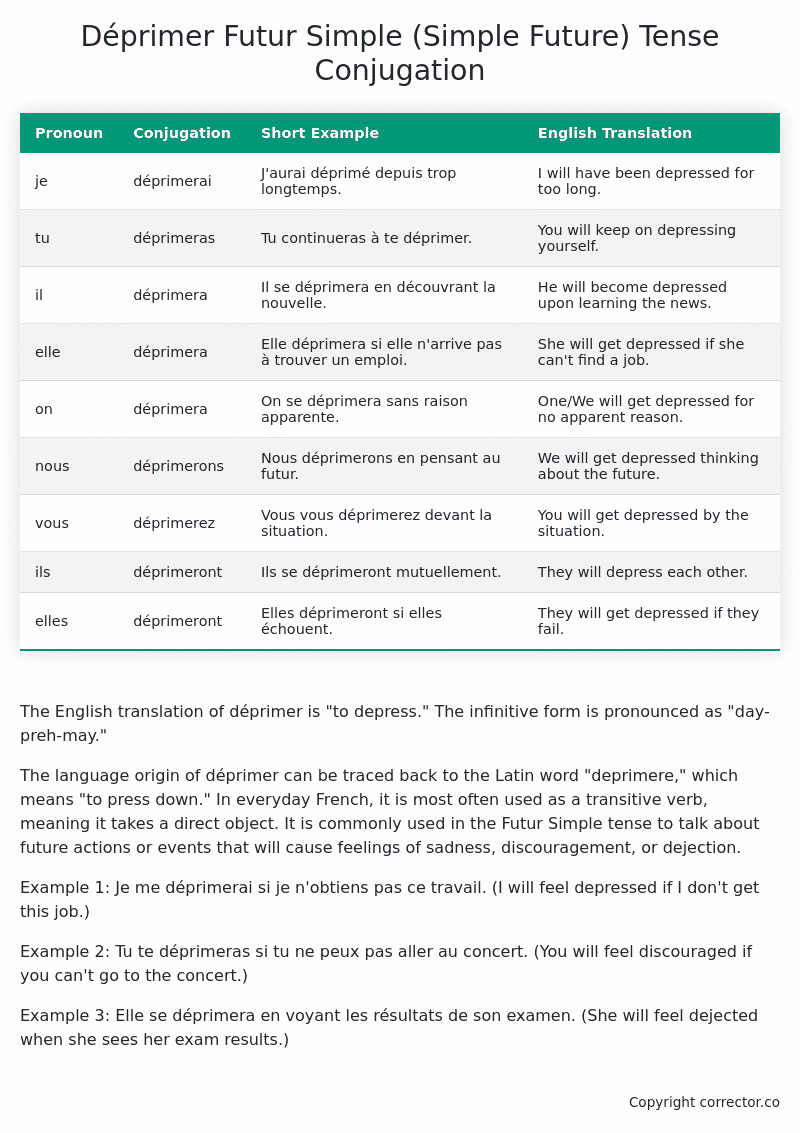Futur Simple (Simple Future) Tense Conjugation of the French Verb déprimer
Introduction to the verb déprimer
The English translation of déprimer is “to depress.” The infinitive form is pronounced as “day-preh-may.”
The language origin of déprimer can be traced back to the Latin word “deprimere,” which means “to press down.” In everyday French, it is most often used as a transitive verb, meaning it takes a direct object. It is commonly used in the Futur Simple tense to talk about future actions or events that will cause feelings of sadness, discouragement, or dejection.
Example 1:
Je me déprimerai si je n’obtiens pas ce travail.
(I will feel depressed if I don’t get this job.)
Example 2:
Tu te déprimeras si tu ne peux pas aller au concert.
(You will feel discouraged if you can’t go to the concert.)
Example 3:
Elle se déprimera en voyant les résultats de son examen.
(She will feel dejected when she sees her exam results.)
Table of the Futur Simple (Simple Future) Tense Conjugation of déprimer
| Pronoun | Conjugation | Short Example | English Translation |
|---|---|---|---|
| je | déprimerai | J’aurai déprimé depuis trop longtemps. | I will have been depressed for too long. |
| tu | déprimeras | Tu continueras à te déprimer. | You will keep on depressing yourself. |
| il | déprimera | Il se déprimera en découvrant la nouvelle. | He will become depressed upon learning the news. |
| elle | déprimera | Elle déprimera si elle n’arrive pas à trouver un emploi. | She will get depressed if she can’t find a job. |
| on | déprimera | On se déprimera sans raison apparente. | One/We will get depressed for no apparent reason. |
| nous | déprimerons | Nous déprimerons en pensant au futur. | We will get depressed thinking about the future. |
| vous | déprimerez | Vous vous déprimerez devant la situation. | You will get depressed by the situation. |
| ils | déprimeront | Ils se déprimeront mutuellement. | They will depress each other. |
| elles | déprimeront | Elles déprimeront si elles échouent. | They will get depressed if they fail. |
Other Conjugations for Déprimer.
Le Present (Present Tense) Conjugation of the French Verb déprimer
Imparfait (Imperfect) Tense Conjugation of the French Verb déprimer
Passé Simple (Simple Past) Tense Conjugation of the French Verb déprimer
Passé Composé (Present Perfect) Tense Conjugation of the French Verb déprimer
Futur Simple (Simple Future) Tense Conjugation of the French Verb déprimer (this article)
Futur Proche (Near Future) Tense Conjugation of the French Verb déprimer
Plus-que-parfait (Pluperfect) Tense Conjugation of the French Verb déprimer
Passé Antérieur (Past Anterior) Tense Conjugation of the French Verb déprimer
Futur Antérieur (Future Anterior) Tense Conjugation of the French Verb déprimer
Subjonctif Présent (Subjunctive Present) Tense Conjugation of the French Verb déprimer
Subjonctif Passé (Subjunctive Past) Tense Conjugation of the French Verb déprimer
Subjonctif Imparfait (Subjunctive Imperfect) Tense Conjugation of the French Verb déprimer
Subjonctif Plus-que-parfait (Subjunctive Pluperfect) Tense Conjugation of the French Verb déprimer
Conditionnel Présent (Conditional Present) Tense Conjugation of the French Verb déprimer
Conditionnel Passé (Conditional Past) Tense Conjugation of the French Verb déprimer
L’impératif Présent (Imperative Present) Tense Conjugation of the French Verb déprimer
L’infinitif Présent (Infinitive Present) Tense Conjugation of the French Verb déprimer
Struggling with French verbs or the language in general? Why not use our free French Grammar Checker – no registration required!
Get a FREE Download Study Sheet of this Conjugation 🔥
Simply right click the image below, click “save image” and get your free reference for the déprimer Futur Simple tense conjugation!

Déprimer – About the French Futur Simple (Simple Future) Tense
Formation of Futur Simple
For regular -er verbs (e.g., parler – to speak)
For regular -ir verbs (e.g., finir – to finish)
For regular -re verbs (e.g., vendre – to sell)
Common Everyday Usage Patterns
Conditional Statements
Interactions with Other Tenses
Futur Antérieur
Conditional
Present
Summary
I hope you enjoyed this article on the verb déprimer. Still in a learning mood? Check out another TOTALLY random French verb conjugation!


